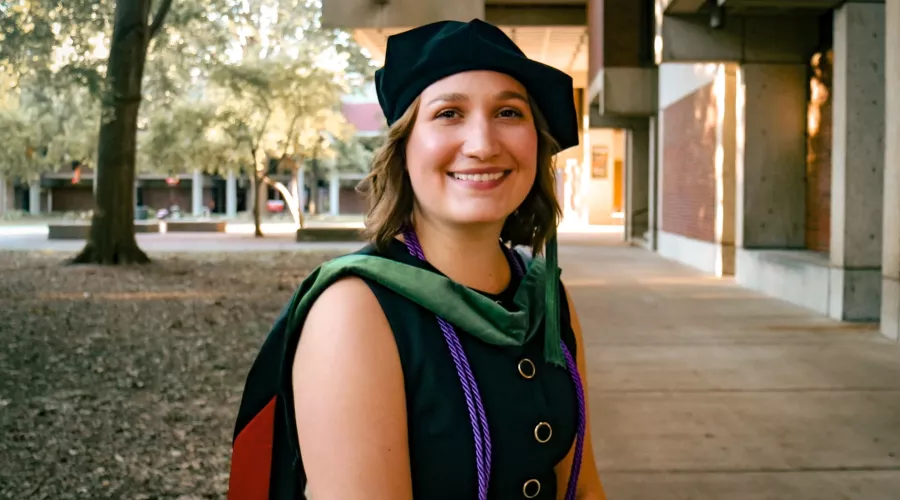A Path to Medicine through the Study of Philosophy
July 16, 2025
By Stephanie Godward, Communications and Marketing Director, College of Arts & Sciences
Mikayla Muse always knew her path would ultimately lead to a career in medicine.
But how she’d get there, what that journey looked like along the way, and determining the destination itself all began with an undergraduate degree in Philosophy.
“I just took a different route to get to where I am because I've always been passionate about the ethical and relational aspects of medicine,” Muse said.
A first-generation college graduate and medical school graduate, Muse initially began her studies as a nursing major. But after taking her first philosophy class, Medical Ethics, taught by Philosophy Professor Lauren Freeman, she changed her major.
“I really loved the conversations on patient autonomy and the ethical responsibility of physicians,” she states. “After that course ended, I ended up switching my major to philosophy with a concentration in healthcare ethics.”
Muse chose to study philosophy at UofL because the professors in the department were the first people to offer her an intellectual freedom that she hadn't experienced before.
“My curiosity was seen as something positive, and I was encouraged to explore different thoughts and opinions. It was just a great experience that I had not had in other departments or other classrooms before.”
An Ever-Evolving Motivation to become a Doctor
Muse’s first inspiration for pursuing a career in medicine was sparked as a child after she witnessed the care her stepfather received when he had cancer.
"I actually saw how caring and loving the doctors were and how good they made my family feel. And that's what I want to do for people,” Muse said. “But by the time I graduated college, the reason I wanted to be a doctor was because I felt like that was the best way for me to enact my commitment to make the world a more socially just place.”
An Award-winning Scholarship Essay
Studying philosophy for four years taught Muse to be a clear, precise and persuasive writer and communicator. This strength recently aided her in winning a $50,000 Primary Care Scholarship essay contest prize through UofL, which had a 500-word limit and a topic surrounding her future career goals.
“I think I'm a very strong writer because that is an essential part of being a philosopher,” she states.
The following is an excerpt from her essay, which intertwines her medical and philosophical goals to help others:
As a future Family Medicine physician, I will work intentionally within communities that have historically been denied equitable care. During medical school, I witnessed how racism, transphobia, classism, and other forms of systemic discrimination consistently and negatively shaped health outcomes. In nearly every clinical setting, I saw how social conditions—housing instability, food insecurity, lack of affirming care—worsened both physical and mental health. These experiences solidified my desire to practice community-focused medicine.
I envision my future at the intersection of clinical care and community organizing. I aspire to lead health initiatives that tackle structural issues—like food access, affordable housing, and LGBTQ+ health equity—while collaborating with mutual aid groups, public health leaders, and trusted community organizations. I believe healthcare must extend beyond the clinic doors, and I plan to be a physician who builds systems of care that can address patients holistically.
She notes in the essay that these funds will support her in pursuing her personal and professional mission rather than focusing solely on increased salaries needed to pay off student loan debt.
Challenges Overcome Along the Way
As a philosophy major, Muse had not taken any science classes during her undergraduate studies, but she was fortunate to have the opportunity to attend UofL’s post-baccalaureate program for students who aspire to attend medical school but lack the required science courses.
“I did the post-baccalaureate pre-medical program at UofL, which is all of the pre-med courses smashed into two years. It's four semesters and it's just immensely challenging,” Muse said. “To go from zero science and math since high school to then two years of very intense, upper-level physics and organic chemistry is a challenge.”
Medical school poses its own challenges as well, with demands on personal time.
“I would say medical school itself is really, really challenging because you don't really have any control over your schedule, and I didn't hear that before I went to med school,” she said. “It's very hard for four years to kind of surrender the majority of your time to a higher purpose.”
Now, Muse is excited to begin her residency this summer at Temple University in Philadelphia, PA.
“I'm excited to be in a new environment because I did do 10 years at UofL, so I'm just excited to see what they have to offer,” she said. “The program that I am doing is family community medicine, so it's very community focused and social justice oriented, which is right up my alley. I'm just excited to learn.”
Related News




